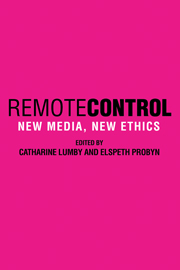Book contents
- Frontmatter
- Contents
- List of Contributors
- Acknowledgements
- 1 Introduction: An Ethics of Engagement
- 2 Real Appeal: The Ethics of Reality TV
- 3 Arguing about Ethics
- 4 ‘Their own media in their own language’
- Beyond the Disconnect: Practical Ethics
- 5 A Viable Ethics: Journalists and the ‘Ethnic Question’
- 6 Ethics, Entertainment and the Tabloid: The Case of Talkback Radio in Australia
- Money versus Ethics
- 7 Eating into Ethics: Passion, Food and Journalism
- Beyond Food Porn
- 8 Ethics impossible? Advertising and the Infomercial
- Pitching to the ‘Tribes’: New Ad Techniques
- 9 Diary of a Webdiarist: Ethics Goes Online
- 10 Control-SHIFT: Censorship and the Internet
- Representing the Asylum Seekers
- 11 The Ethics of Porn on the Net
- Ethics and Sex
- 12 Grassroots Ethics: The Case of Souths versus News Corporation
- 13 Great Pretenders: Ethics and the Rise of Pranksterism
- The Limits of Satire
- Index
9 - Diary of a Webdiarist: Ethics Goes Online
Published online by Cambridge University Press: 18 December 2009
- Frontmatter
- Contents
- List of Contributors
- Acknowledgements
- 1 Introduction: An Ethics of Engagement
- 2 Real Appeal: The Ethics of Reality TV
- 3 Arguing about Ethics
- 4 ‘Their own media in their own language’
- Beyond the Disconnect: Practical Ethics
- 5 A Viable Ethics: Journalists and the ‘Ethnic Question’
- 6 Ethics, Entertainment and the Tabloid: The Case of Talkback Radio in Australia
- Money versus Ethics
- 7 Eating into Ethics: Passion, Food and Journalism
- Beyond Food Porn
- 8 Ethics impossible? Advertising and the Infomercial
- Pitching to the ‘Tribes’: New Ad Techniques
- 9 Diary of a Webdiarist: Ethics Goes Online
- 10 Control-SHIFT: Censorship and the Internet
- Representing the Asylum Seekers
- 11 The Ethics of Porn on the Net
- Ethics and Sex
- 12 Grassroots Ethics: The Case of Souths versus News Corporation
- 13 Great Pretenders: Ethics and the Rise of Pranksterism
- The Limits of Satire
- Index
Summary
IT WAS MEANT TO BE A WEEKLY ONLINE COLUMN ON FEDERAL POLITICS, a mere change in the forum for my work. It was my price for agreeing to do another stint as the Sydney Morning Herald's chief of staff at our Canberra bureau in 2000, so I didn't lose my public voice while doing a behind-thescenes organisational job. A year later it was my full-time job, yet until I agreed to do this chapter I hadn't systematically considered the ethics of it all, or how my ethical duties as a journalist were adapting to the Internet experience.
After Sydney Morning Herald editor Paul McGeough gave me the column, online editor Tom Burton pointed me to a couple of journalists' weblogs in the United States, where specialist reporters jotted down developments in their area, inside stories, and comment. The advantage for me was that I had no deadlines, so could write something now and then when I had time.
I had a quick look, got scared, and decided to start with a blank page and see what happened. When the technical people sent their design for the Webdiary page, I was horrified that they'd included my e-mail address. I had organised a silent home number after receiving hate snail mail and abusive phone calls while covering the Wik legislation and Pauline Hanson's 1998 federal election campaign, and the last thing I wanted was to invite an onslaught. ‘Get used to it’, Tom said. ‘Interactivity is the future’.
- Type
- Chapter
- Information
- Remote ControlNew Media, New Ethics, pp. 159 - 172Publisher: Cambridge University PressPrint publication year: 2003



